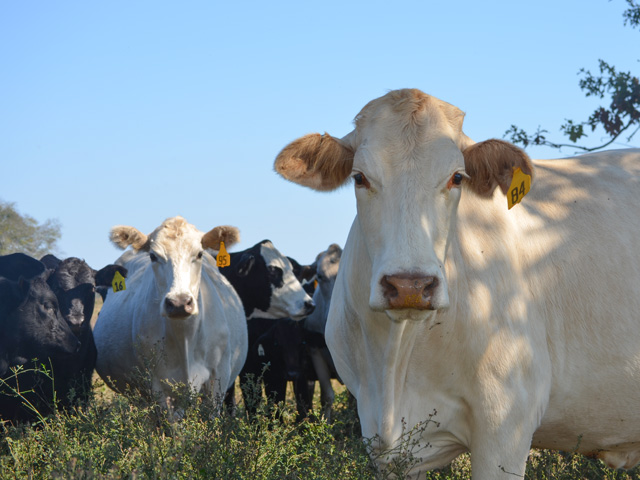Ask the Vet
Photosensitization in Light-Colored Cattle
READER QUESTION:
We had a Charolais cow with large patches of skin on her head and back that are scabbed over. They look like they are peeling up around the edges. She is in good body condition, and she does not seem sick. What could this be?
DR. KEN MCMILLAN'S ANSWER:
This sounds like photosensitization. I have described it in this column before as a chemical sunburn. It is more common on light skin and mucus membranes.
P[L1] D[0x0] M[300x250] OOP[F] ADUNIT[] T[]
There are two forms of photosensitization. Primary photosensitization is due to the consumption of a plant that contains photodynamic agents. These are absorbed into the blood stream and travel to the skin. Ultraviolet (UV) light activates them and creates a severe inflammatory reaction in the skin. Plants most commonly associated with this condition include St. John's Wort, buckwheat, and smartweed.
Secondary photosensitization is far and away the most common form we see. With this condition, the liver is damaged from something the animal ate or some type of liver disease. Chlorophyll from plants the cow eats is broken down into phylloerythrin and excreted by the liver in bile. With liver damage, phylloerythrin builds up in the blood stream and the skin. It is activated in the skin by UV light, creating skin lesions. Plants most associated with this form include alsike clover, comfrey, rattle box, fiddleneck, and ragwort.
Treatment involves removing animals from the pastures containing the plants causing the problem and protecting them from sunlight. If the teats of cows are affected, they may not allow calves to nurse. In those cases calves will need supplementation until the cows recover. In some cases, antibiotics may be needed if skin becomes infected.
**
Editor's Note:
Please contact your veterinarian with questions pertaining to the health of your herd or other animals. Every operation is unique, and the information in this column does not pertain to all situations. This is not intended as medical advice but is purely for informational purposes.
Write Dr. Ken McMillan at Ask the Vet, 2204 Lakeshore Dr., Suite 415, Birmingham, AL 35209, or email vet@progressivefarmer.com.
(c) Copyright 2021 DTN, LLC. All rights reserved.






